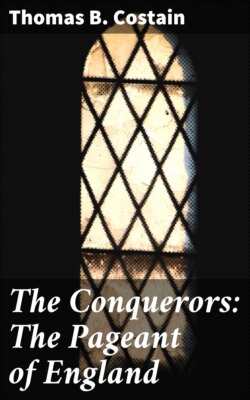Читать книгу The Conquerors: The Pageant of England - Thomas B. Costain - Страница 21
На сайте Литреса книга снята с продажи.
3
ОглавлениеTable of Contents
All this time Gundulph the Weeper had continued his work on the White Tower. He had built it ninety feet high, and it frowned over London like the threat of tyranny, as indeed it was. The walls, which were fifteen feet thick, were filled with stairways and corridors and even small bedchambers. The Weeper had been so careful to make it secure that the Tower had one door only, and that a narrow one. The vaults beneath, which were vast and dark and cavernous, had one means of communication with the ground floor, a narrow and winding stairway. Around the grim structure a high wall had been erected. The Tower, in fact, was hard to get into and even harder for anyone who wanted to get out.
And now it was completed and ready for its first unwilling occupant.
When his master died (to cast ahead of our story for a moment) Ralph Flambard was promptly laid by the heels by Henry, the new King. All the people who had suffered from his policy of unlaw and unright, which meant every landed man in the kingdom, clamored for his punishment. Henry did not need any urging in this matter. He had a bone to pick with Master Ralph himself, the wily churchman having by some devious means robbed the prince of land willed him by his mother. So the once powerful bishop was marched to the Tower and lodged in rooms on the third story, which was known as the Banqueting Floor.
He was allowed to live in comfort and even state, with a suite of large, light rooms, his own servants and chaplains, a fine fireplace, two shillings a day for his food from the royal funds (and the right to send out for extras), and even the Constable of the Tower, one William de Mandeville, to act as his special keeper. But Ralph Flambard had been the most powerful man in England after the King and was still one of the wealthiest, and he did not like the confinement of his prison. He pulled every conceivable string to secure his freedom, even appealing to Anselm, who had just returned to resume his duties as archbishop, pointing out that he, Flambard, was a priest and above secular law. When this appeal reached him, the noble old man ceased to be a saint and for one moment was completely human. “Out on this caitiff!” he cried. “I know him not, neither as brother nor as priest!”
So the prisoner turned to a surer means of escape, his own abundant wits. He studied his guards and found them without exception a dull lot, fond of good wine and a well-filled trencher and a jolly song. He began to have them at his table regularly, using as excuse his desire for company. One winter night (it was in February 1101, and very cold) the wine served at the bishop’s table was particularly ample and potent. It is just possible that it contained a drug as well, for soon the untended candles revealed all the guards sprawling across the table or sleeping on the floor. One of the servants then took a long rope which had been smuggled in (it had to be long, for the windows of the Banqueting Floor were sixty-five feet above the ground) and tied one end to an iron bar in the bishop’s window. The bishop had become fat and short of breath and he descended the rope painfully and with as much wheezing and puffing as came from the slumbering guards in the rooms above.
The rope, it developed, was not long enough. When Ralph Flambard reached the end of it, he saw yawning black space beneath and no more support for his feet than if he were a condemned prisoner dangling at the end of a rope. It took him some time to get his courage up for the drop, but finally he said a prayer and let himself go. He landed heavily, one leg doubled up under him.
He was picked up by his confederates and carried to a boat which took him across the Channel to France.
The Tower, in spite of all the Weeper’s care and ingenuity, had failed to hold its first prisoner. Many centuries were to pass, however, before another got away.
Ralph’s victims had been the landholders, the men of wealth, and so the common people had not disliked him. It is probable, in fact, that they were glad when he made his escape. All the jackals who followed him down the centuries, to serve as extortioners for their kings, were men of a sinister taint. They were miserly in type, with the long claw, the heavy-lidded eye, the grim mien. Ralph Flambard was a genial rogue, full-bellied and fond of good living and a coarse joke. But make no mistake about him. Here was the sliest, the most capable, and the most dangerous rogue in English history. He was so clever and his methods were so deeply rooted in legal chicanery that it was hard to tear them out. The evil he brought into the world did not end that cold night when he landed on his fat rump in the Tower ditch. It lived after him, and it took six centuries to exorcise the last trace of it.
